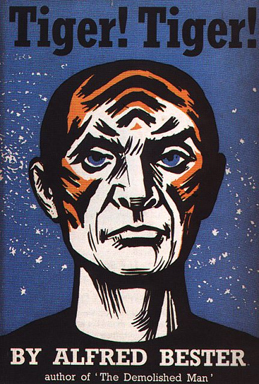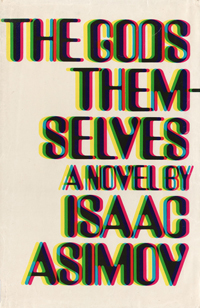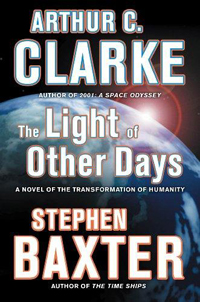I know I beat the reading horse too much. Sorry. This is going to be another one of those posts, but hopefully a bit more enjoyable… provided you like to read.
It’s been a while since my last reading recommendations post. Since then, I got sucked into a science fiction vortex. Yes, I know, scifi sounds like a genre for geeks that prefer fantasy to reality, but I think that’s a bad rap. If I were to distill the essence of all the science fiction that I’ve read down to one thing, I’d say it is the kind of literature that earnestly reveals our dreams for our own future (or in some cases, our nightmares). The artifacts of the dreaming—the technology, the travel, the alien worlds and life forms, the bending and stretching of time far beyond human limits—are what I think tend to repel readers. That sort of thing interrupts the average suspension of disbelief too easily for too many people. But if you’re willing to dream again, to have the wonder of a child, to earnestly imagine something simply for the joy of doing so, to cast your cynicism aside, then you may find something inspirational in this genre.
Designers, that’s you, right?
Here are a few that I’ve read in the past year or so that I think, given the right pitch, may be of interest. Oh, one disclaimer: not every book on this list is up to modern standards of political correctness. Some were written 40-50 years ago, since before a significant amount of social change that we enjoy today, so yes, there will be some sexism, racism, and imperialism that you may find problematic. That said…


The Stars My Destination
Ok, you’ve probably immediately noticed that the book in the image to the right is called “Tiger! Tiger!” This was the original title of the first UK edition book, written by Alfred Bester, in 1956. Set in a somewhat far-off future, the book centers on Gulliver Foyle, a man out for revenge for being abandoned to die in space after the ship on which he served met with disaster. The requisite futuristic technology to play a large part is not really a technology but a technique—the discovered ability to teleport, or jaunte, as they call it, from one place to another. Foyle’s is a pretty strange character study. He is generally unsympathetic, so focused on vengeance that he cannot see his own potential and the changes he does go through. He evolves to a different kind of person—not necessarily more likeable, but different enough to be intriguing and has a profound impact upon the world. What I found to be the key point is that if we believe we have no value, then we will be blind to the value we do have even as it is shared with and acknowledged by others. Sometimes it takes more humility to acknowledge one’s value than one’s lack of it.
Cool Idea: The discovery of a biological/metaphysical teleportation technique
Moral Challenge: We each have a duty to recognize the impact we have, for better or for worse.


The Gods Themselves
This is a novel written by Isaac Asimov in 1972, one he later stated was his favorite of his works. While it’s somewhat too complicated to explain in detail here (the Wikipedia entry will fill you in), I think I can summarize it by saying that it tells the tale of a scientific breakthrough that extracts energy from a seemingly abundant source in another, parallel universe. However, this breakthrough turns out to be a danger as the exchange creates a dangerous imbalance that jeopardizes both universes. But what I found fascinating was how the human characters in “our” universe, so driven by personal ambition and the need to maintain power and prestige, are sadly incapable of cooperation. The parallel universe, inhabited by organisms that form triunions, epitomizes cooperation to such an extreme that it’s impossible to not consider the ways in which we compromise our own well being due to selfish ambitions.
Cool Idea: A parallel universe with different laws of physics could supply free energy.
Moral Challenge: No man (or being) is an island.


The Light of Other Days
So, not the most attractive cover of the bunch. But this novel, by Arthur C. Clarke and Stephen Baxter, is truly profound. The story surrounds the discovery (and patenting by an amoral CEO) of a technology that uses wormholes to transmit light waves between two distant points. It doesn’t take long before that technology is developed to detect light waves from other points in time. What began as a communications device becomes a time viewer—one which makes looking upon 50 years ago as easy as 5 milliseconds ago. And that’s the trouble: the difference between 5 milliseconds and now is trivial. The time viewer becomes an all seeing eye, one that utterly transforms society causing some to embrace the destruction of privacy and others to retreat and “cloak” themselves at all times. I was captivated by how this particular technological story uncovers the vulnerability we are experiencing today—the loss of privacy, the reshaping of what is public and private due to new ways of communicating. Clarke and Baxter published this in 2000, making their view somewhat prescient if you ask me.
Cool Idea: A chronovisor (time viewer), which is a somewhat common scifi trope.
Moral Challenge: Ever extension introduces new limitations (I think that’s a McLuhanism).

Wow, this is longer than I intended. I’d better cut this short and just recommend a few more in a list and sum them up. The rest of these books explore some themes that are by no means uncommon to science fiction: generation starships—which extend the reach of life, both biologically and circumstantially, usually in the nick of time saving a small group from disaster—as well as other types of technological immortality, the role of entropy in shaping society, and of course cultural decadence and the role technology plays in that. Ultimately, this form tends to return me to a question that is central to my life and worldview: not whether technology is, in and of itself, good or bad, but what our technology says about us. I concluded an upcoming Print column by saying that technology is a statement of intent, the only trouble is that most of the time the statement becomes clear long after we’ve made it.
Here are some other great books that fit in with these ideas:
Embassytown, by China Miéville
Stories of Your Life: And Others, by Ted Chiang
To Your Scattered Bodies Go, by Philip José Farmer
Old Twentieth, by Joe Haldeman
Last thing. I read plenty of sci-fi. I’ve got a huge list of titles left to read in that genre. But I’d love to add to my overall “to read” list anything that inspired you this year. What do you recommend?


